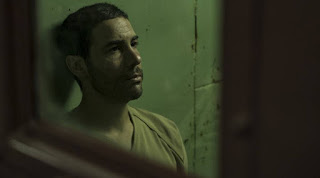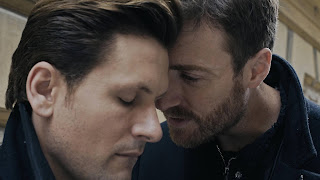Movie Review - The Mauritanian
Documentaries like Ghosts of Abu Ghraib (2007) and Standard Operating Procedure (2008) shined a spotlight on the issue of torture in that Iraqi prison. Prior to those films, we got information about such abuses occurring a bit closer to home at Guantanamo Bay, Cuba. Michael Winterbottom's The Road to Guantánamo (2006) was one of the first films to depict a Muslim man being the victim of abuse and torture from his perspective. A lot of films and TV shows like The Report (2019) are more from the point-of-view of White Americans uncovering such abuse and fighting or resisting the Islamophobia. Camp X-Ray (2014) is one of the few examples to include both perspectives.
Tahar Rahim (The Past and A Prophet) stars as Mohamedou Ould Salahi, a man from the country of Mauritania, an Arabic country in western Africa that used to be a French colony. Mohamedou grew up therefore speaking Arabic and French. Before we meet him, we learn that he's a member of Al Qaeda, the terrorist group that was behind the attack on 9/11 resulting in 3000 people dying. Because of some circumstantial evidence, he's being held in Guantanamo or Gitmo. Whether he's guilty or whether it's guilt by association is the question. In the first scene in which we see him in living color, we see Mohamedou in the shadows before he then leans into the light. This then becomes a theme of the film, bringing this Muslim man out of the shadows and into the light in order to be seen and heard.This is a legal drama in the vein of Just Mercy (2019), The Hurricane (1999) and Paradise Lost: The Child Murders at Robin Hood Hills (1996) or even a series like When They See Us (2019). It's about a miscarriage of justice when someone has to prove their innocence despite all the odds being stacked against them, odds that include some kind of bigotry or prejudice. It's also inherently about corruption within law enforcement and exposing that corruption if by no other means than the accused telling his story, as well as through patience, which this film, directed by Kevin Macdonald (The Eagle and The Last King of Scotland), didn't do a great job of depicting. The passage of time isn't really felt here.
Jodie Foster (The Silence of the Lambs and The Accused) co-stars as Nancy Hollander, the lawyer who comes to represent him. She doesn't let her family or friends get in the way of her work. She's dedicated to her case and her client. She's a defense attorney who has represented alleged rapists and murderers. Some people ask her why, especially why she would defend someone who's an alleged terrorist responsible for 9/11. She believes everyone deserves a fair trial. She operates as a bit of a fierce advocate. At first, her client's guilt or innocence doesn't matter. Yet, it's important for Mohamedou if she believes him. She responds in a similar way as Tom Cruise's character in A Few Good Men (1992). She basically says, "It doesn't matter what I believe. It only matters what I can prove."Beyond exploring the extreme case of Islamophobia, this film is in a lot of ways about ignorance, American ignorance of world events. There is a joke about American ignorance about things that aren't happening in the United States. One of those ignorant things is the origins of Al-Qaeda and the United States' role in it, especially in regard to the Soviet-Afghan War. However, the largest thing toward which this film builds is putting us in the shoes and the head of Mohamedou, as he's being tortured. When the film eventually gets there, it's powerfully acted and powerfully shot in a way that really engages and brings the audience into Mohamedou's experience. It's as strong and as moving as the violent scenes toward the end of The Passion of the Christ (2004).
Benedict Cumberbatch (Doctor Strange and The Imitation Game) also co-stars as Stuart Couch, a Naval lawyer who represents the United States government in its prosecution of Mohamedou. Stuart has a personal connection in that he lost a friend on 9/11. He's close to the family who wants someone to pay. The problem that he starts to realize is that people want not just someone directly responsible but anyone they can get, even if that person had nothing to do with 9/11. He catches wind of this through information that's being hidden from him, hidden from him by people like Neil Buckland, played by Zacharay Levi (Shazam! and Chuck).Another filmmaking trick is how Macdonald changes aspect ratio and film stock when depicting flashbacks of Mohamedou's life. Whether or not, he shot on actual celluloid or if he just used a digital effect is unknown, but for any scene that takes place in the past or prior to 9/11, it looks as though it was shot on 16 mm for its grainy texture and in Academy ratio or more square or box-like. This helps for scenes depicting Mohamedou imprisoned in Gitmo and conveying how boxed-in or confined he must have felt. The grainy texture could also help to convey the rough nature of the environment in which he was trapped. It also could help convey that same feeling for his time in the Middle East. Macdonald's film could have done more to explore Mohamedou's life and past, as most biopics would, but it's still effective in what he lays down here.
Rated R for violence, including a sexual assault, and language.
Running Time: 2 hrs. and 9 mins.
Playing in theaters.















Comments
Post a Comment